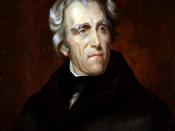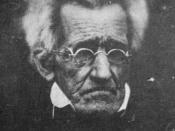The dislocation and disorders caused by the Industrial Revolution had a profound effect on the American politics. Andrew Jackson came to presidency in 1824 and he defined himself as the protector of farmers and workers. Liberty and Tyranny had come to mean two different things. The Jacksonian Democracy sought to advance liberty by removing the "special privileges"ÃÂ of the rich and the business class. Opposed to the Jacksonians were the Whigs, formed by Henry Clay and Daniel Webster, who believed that the federal government had a legitimate role in promoting economic growth. Andrew Jackson believed strongly in Laissez-faire in that the people should govern themselves, but instead he took away power from states rights and made a more powerful executive branch, all because of his ambitions being too far fetched, and the dirt farmers were now literally running the country (spoils system), which proved fatal because in order to run a government, one has to know what they are doing.
Andrew Jackson was just a common man and he sought out to run the country in favor of his southern and western men. He believed that the power should be in the states and he supported John Calhoun's concept that a state could nullify any federal law and secede from the Union if the federal government persisted in an action unfavorable to it. Although Jackson favored states rights, he openly went against his laissez-faire principles in his views on internal improvements. He didn't favor them and in 1830, he vetoed a bill for improving the Maysville Road. A turning point in the U.S economy was the1828 Tariff of Abomination. The Tariff of abomination helped only manufacturers in the North by making European imports more expensive than the Northern products. Another example of state rights was the Webster-Hayne debate, in which...


